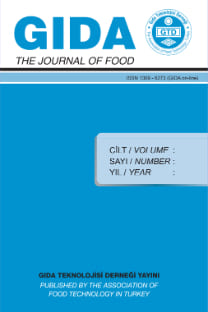Tavuk Etlerinden Salmonella spp. Belirlenmesine Yönelik Hızlı bir Yöntem
İMA, PZR, Salmonella, tavuk eti
A Rapid Method Intended for the Determination of Salmonella spp. From Chicken Meats (Turkish with English Abstract)
IMS, PZR, Salmonella, chicken meat,
___
- http://www.cdc.gov/mmwr/preview/mmwrhtml/mm5514a2.htm
- http://www.cdc.gov/mmwr/preview/mmwrhtml/mm5614a4.htm
- D’Aoust JY. 1991. Pathogenicity of foodborne Salmonella, International J Food Microbiol, 12: 14-70.
- Hedberg CW, MacDonald, KL and Osterholm, MT. 1994. Changing epidemiology of food-borne disease: a Minnesota perspective. Clin Infect Dis, 18: 671-682.
- Altekruse SF, Bauer N, Chanlongbutra, A, DeSagun R, Naugle A, Schlosser W, Umholtz R and White P. 2006. Salmo- nellaEnteritidis in broiler chickens, United States, 2000-2005. Emerg Infect Dis, 12: 1848-1852.
- Mandrell RE and Wachtel MR. 1999. Novel detection techniques for human pathogens that contaminate poultry. Curr Opin Biotech, 10: 273-278.
- Carli KT, Eyigor A and Caner V. 2001. Prevalence of Salmonella serovars in chickens in Turkey. J Food Protect, 64: 1832-1835.
- Eyigor A, Goncagul G, Gunaydin E and Carli KT. 2005. Salmonella profile in chickens determined by real-time polyme- rase chain reaction and bacteriology from years 2000 to 2003 in Turkey, Avian Pathol, 34 (2) 101-105.
- Rijpens N, Herman L, Vereecken F, Jannes G, Smedt JD and Zutter LD. 1999. Rapid detection of stressed Salmonel- laspp. in dairy and egg products using immunomagnetic separation and PCR. Int J Food Microbiol. 46: 37-44.
- Boraychuk VM, Gensler GE, McFall ME, King RK and Renter DG. 2007. A real-time PCR assay for the detection of Sal- monellain a wide variety of food and food-animal matrices. J Food Protect, 70 (5): 1080-1087.
- Mansfield LP and Forsythe SJ. 2000. Detection of salmonellae in food, Rev Med Microbiol, 11 (1): 37-46.
- Seo KH, Valentin-Bon IE, Brackett RE and Holt PS. 2004. Rapid, specific detection of Salmonella Enteritidis in pooled eggs by real-time PCR. J Food Protect, 67 (5): 864-869.
- Pan T-M and Liu Y-J. 2002. Identification of Salmonella enteritidis isolates by polymerase chain reaction and multiplex polymerase chain reaction. J Microbiol, Immunol Infect, 35: 147-151.
- Riyaz-Ul-Hassan S, Verma V and Qazi GN. 2004. Rapid detection of Salmonella by polymerase chain reaction. Mol Cell Probe, 18: 333-339.
- Jeníková G, Pazlarová J and Demnerová K. 2000. Detection of Salmonella in food samples by the combination of im- munomagnetic separation and PCR assay. Int Microbiol, 3: 225-229.
- S˘panová A, Rittich B, Horák D, Lenfeld J, Prode˘lalová J, Suc˘iková J and S˘trumcová S. 2003. Immunomagnetic sepa- ration and detection of Salmonella cells using newly designed carriers. J Chromatogr A, 1009: 215-221.
- S˘panová A, Rittich B, Karpís˘ková R, C˘echová L and S˘kapová D. 2001. PCR identification of Salmonella cells in food and stool samples after immunomagnetic separation. Bioseparation, 9: 379-384.
- Fratamico PM and Crawford CG. 1999. Detection by commercial particle-based assays. In Encylopedia of Food Micro- biology, Volume 2, RK Robinson (chief ed), pp. 655-661, Academic Press, Great Britain.
- Safarik I and Safarikova M, 1999. Review: Use of magnetic techniques for the isolation of cells. J Chromatogr B, 722: 33-53.
- Skjerve E and Olsvik O. 1991. Immunomagnetic separation of Salmonella from foods. Int J Food Microbiol, 14: 11-18.
- Molla B, Kleer J and Sinell H-J. 1994. Detection of Salmonella in foods by immunomagnetic separation. Arch Lebens- mittelhyg, 45 (5): 110-113.
- Cudjoe KS, Krona R and Olsen NN. 1994. IMS: a new selective technique for detection of Salmonella in foods. Int J Fo- od Microbiol, 23: 159-165.
- Mansfield LP and Forsythe SJ. 1993. Immunomagnetic separation as an alternative to enrichment broths for Salmonel- ladetection. Lett Appl Microbiol, 16: 122-125.
- Rahn K, de Grandis SA, Clarke RC, McEwen SA, Galan JE, Ginocchio C, Curtis III R and Gyles CL. 1992. Amplificati- on of an invA gene sequence of Salmonella typhimurium by polymerase chain reaction as a specific method for detec- tion of Salmonella. Mol Cell Prob, 6: 271-279.
- Heyndrickx M, Vandekerchove D, Herman L, Rollier I, Grijspeerdt K and De Zutter L. 2002. Routes for Salmonella con- tamination of poultry meat: epidemiological study from hatchery to slaughterhouse. Epidemiol Infect, 129: 253-265.
- Widjojoatmodjo MN, Fluit AC, Torensma R, Keller BHI and Verhoef J. 1991. Evaluation of the magnetic immuno PCR assay for rapid detection of Salmonella. Eur J Clin Microbiol, 10 (11): 935-938.
- Suslow TV, Wu J, Fett WF and Harris LJ. 2002. Detection and elimination of Salmonella Mbandaka from naturally con- taminated alfalfa seed by treatment with heat or calcium hypochlorite. J Food Protect, 65 (3): 452-458.
- ISSN: 1300-3070
- Yayın Aralığı: 6
- Başlangıç: 1976
- Yayıncı: Prof. Dr. İbrahim ÇAKIR
Soya ve Soya Ürünlerinin Fonksiyonel Gıda Bileşenleri
Dilara NİLÜFER, Dilek BOYACIOĞLU
Özge Şakıyan DEMİRKOL, Gülüm ŞUMNU, Serpil ŞAHİN
Tavuk Etlerinden Salmonella spp. Belirlenmesine Yönelik Hızlı bir Yöntem
Birce Mercanoğlu TABAN, S. Aykut AYTAÇ
Oğuz AYDEMİR, Muhammet DERVİŞOĞLU, Fehmi YAZICI, Hasan TEMİZ
Serbest Radikaller ve Antioksidan Gıdalarla İnhibisyonu
Oğuz AYDEMİR, Muhammet DERVİŞOĞLU, Hasan TEMİZ, Fehmi YAZICI
Ankara Bölgesinde Tüketime Sunulan Türk Beyaz Peynirlerinde Nitrat ve Nitrit Düzeylerinin Saptanması
Buket ER, Aysel Bayhan ÖKTEM, Gülderen YENTÜR
Bezelyelerde Klorofil Degradasyonu ve Renk Kaybı Üzerine Isıl İşlemin Etkisi (İngilizce)
Hande Selen ERGE, Feryal KARADENİZ, Nuray KOCA, Yeşim SOYER
Effect of heat treatment on chlorophyll degradation and color loss in green peas
